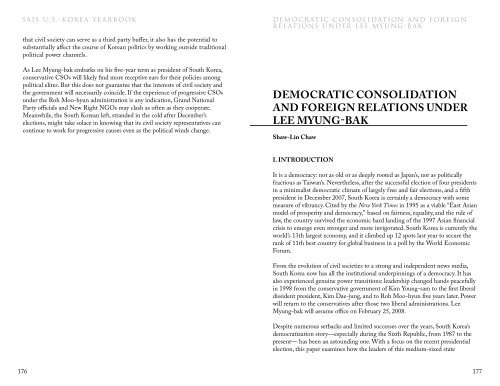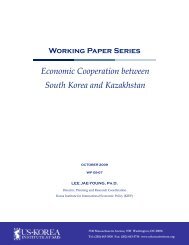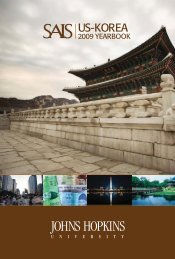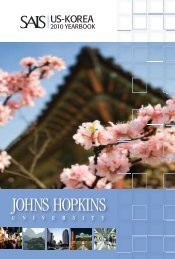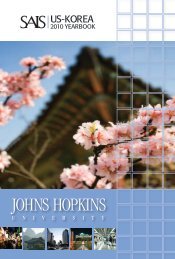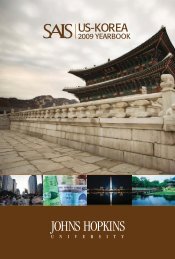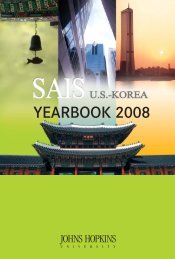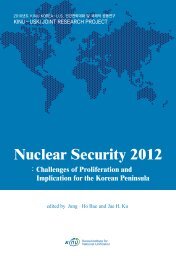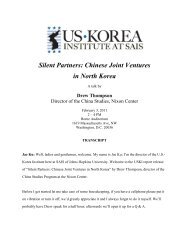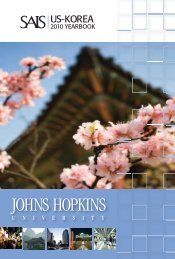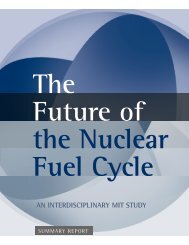Civil Society and the State in South Korea, by Michael Richardson
Civil Society and the State in South Korea, by Michael Richardson
Civil Society and the State in South Korea, by Michael Richardson
You also want an ePaper? Increase the reach of your titles
YUMPU automatically turns print PDFs into web optimized ePapers that Google loves.
SAIS U.S.-KOREA YEARBOOK<br />
DEMOCRATIC CONSOLIDATION AND FOREIGN<br />
RELATIONS UNDER LEE MYUNG-BAK<br />
that civil society can serve as a third party buffer, it also has <strong>the</strong> potential to<br />
substantially affect <strong>the</strong> course of <strong>Korea</strong>n politics <strong>by</strong> work<strong>in</strong>g outside traditional<br />
political power channels.<br />
As Lee Myung-bak embarks on his five-year term as president of <strong>South</strong> <strong>Korea</strong>,<br />
conservative CSOs will likely f<strong>in</strong>d more receptive ears for <strong>the</strong>ir policies among<br />
political elites. But this does not guarantee that <strong>the</strong> <strong>in</strong>terests of civil society <strong>and</strong><br />
<strong>the</strong> government will necessarily co<strong>in</strong>cide. If <strong>the</strong> experience of progressive CSOs<br />
under <strong>the</strong> Roh Moo-hyun adm<strong>in</strong>istration is any <strong>in</strong>dication, Gr<strong>and</strong> National<br />
Party officials <strong>and</strong> New Right NGOs may clash as often as <strong>the</strong>y cooperate.<br />
Meanwhile, <strong>the</strong> <strong>South</strong> <strong>Korea</strong>n left, str<strong>and</strong>ed <strong>in</strong> <strong>the</strong> cold after December’s<br />
elections, might take solace <strong>in</strong> know<strong>in</strong>g that its civil society representatives can<br />
cont<strong>in</strong>ue to work for progressive causes even as <strong>the</strong> political w<strong>in</strong>ds change.<br />
DEMOCRATIC CONSOLIDATION<br />
AND FOREIGN RELATIONS UNDER<br />
LEE MYUNG-BAK<br />
Shaw-L<strong>in</strong> Chaw<br />
I. INTRODUCTION<br />
It is a democracy: not as old or as deeply rooted as Japan’s, nor as politically<br />
fractious as Taiwan’s. Never<strong>the</strong>less, after <strong>the</strong> successful election of four presidents<br />
<strong>in</strong> a m<strong>in</strong>imalist democratic climate of largely free <strong>and</strong> fair elections, <strong>and</strong> a fifth<br />
president <strong>in</strong> December 2007, <strong>South</strong> <strong>Korea</strong> is certa<strong>in</strong>ly a democracy with some<br />
measure of vibrancy. Cited <strong>by</strong> <strong>the</strong> New York Times <strong>in</strong> 1995 as a viable “East Asian<br />
model of prosperity <strong>and</strong> democracy,” based on fairness, equality, <strong>and</strong> <strong>the</strong> rule of<br />
law, <strong>the</strong> country survived <strong>the</strong> economic hard l<strong>and</strong><strong>in</strong>g of <strong>the</strong> 1997 Asian f<strong>in</strong>ancial<br />
crisis to emerge even stronger <strong>and</strong> more <strong>in</strong>vigorated. <strong>South</strong> <strong>Korea</strong> is currently <strong>the</strong><br />
world’s 13th largest economy, <strong>and</strong> it climbed up 12 spots last year to secure <strong>the</strong><br />
rank of 11th best country for global bus<strong>in</strong>ess <strong>in</strong> a poll <strong>by</strong> <strong>the</strong> World Economic<br />
Forum.<br />
From <strong>the</strong> evolution of civil societies to a strong <strong>and</strong> <strong>in</strong>dependent news media,<br />
<strong>South</strong> <strong>Korea</strong> now has all <strong>the</strong> <strong>in</strong>stitutional underp<strong>in</strong>n<strong>in</strong>gs of a democracy. It has<br />
also experienced genu<strong>in</strong>e power transitions: leadership changed h<strong>and</strong>s peacefully<br />
<strong>in</strong> 1998 from <strong>the</strong> conservative government of Kim Young-sam to <strong>the</strong> first liberal<br />
dissident president, Kim Dae-jung, <strong>and</strong> to Roh Moo-hyun five years later. Power<br />
will return to <strong>the</strong> conservatives after those two liberal adm<strong>in</strong>istrations. Lee<br />
Myung-bak will assume office on February 25, 2008.<br />
Despite numerous setbacks <strong>and</strong> limited successes over <strong>the</strong> years, <strong>South</strong> <strong>Korea</strong>’s<br />
democratization story—especially dur<strong>in</strong>g <strong>the</strong> Sixth Republic, from 1987 to <strong>the</strong><br />
present— has been an astound<strong>in</strong>g one. With a focus on <strong>the</strong> recent presidential<br />
election, this paper exam<strong>in</strong>es how <strong>the</strong> leaders of this medium-sized state<br />
176 177


